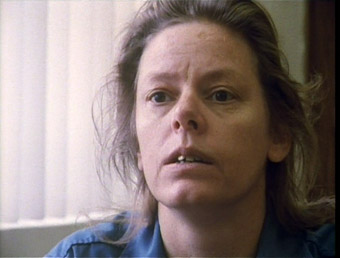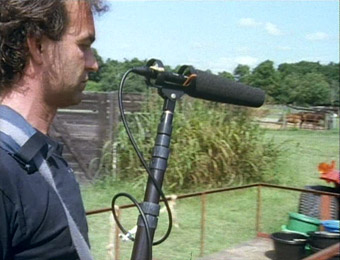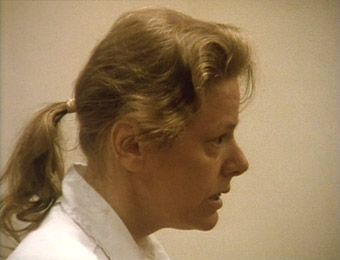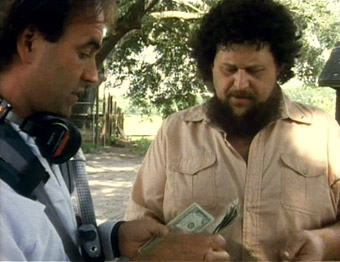This
DVD set contains both of Nick Broomfield's documentaries on
Aileen Wuornos. The second film, Aileen: Life and
Death of a Serial Killer, his reviewed here.
Aileen
Wuornos was something of a gift to tabloid newspaper writers.
Dubbed the first female serial killer, she worked as a
prostitute, killed only men (all of them clients) and was
at the time of her arrest in a serious relationship with another woman.
I recently brought up the second of Broomfield's documentaries
on Wuornos (reviewed here)
in a media class and asked if anyone had heard of her.
One particularly tabloid educated student piped up, "Oh
yeah, she's that man-hating, murdering lesbian bitch-queen
from hell." After admonishing him for such an appallingly
narrow-minded and frankly moronic evaluation, I suggested
he try for the job of headline writer for The Sun.
But that's pretty much the image of Wuornos that's been
promoted by the media both here and in the US, for whom
sensationalism is a stock in trade and the truth too often
something that gets in the way of a juicy story.
Right from the start, Nick Broomfield's compelling documentary
challenges this view, and in the process of
investigating what Broomfield himself admits was an interesting
inversion of the usual story of male serial killer murdering
female prostitutes, the nuts and bolts of getting to the truth became a subject
that in itself proved worthy of study.

Some
background for the uninitiated. Aileen – known more commonly
as Lee – Wuornos, a prostitute who picked up her clients
by hitch-hiking the highways, was arrested in January
1991 at the Last Resort biker bar in Harbor Oaks, Florida,
for the murder of seven men over a one year period. Aileen
ultimately admitted to six of the killings, but claimed
that she had acted in self-defence and that her first
victim, Richard Mallory, had brutally raped her prior
to his death, but no prior record of violence on Mallory's
part was produced by police to substantiate these claims.
Detectives helped build the case against Aileen by persuading
her lover, Tyria Moore, to phone her in jail and trick
her into confessing, and to later testify against her against her in court. Aileen's case was taken up by lawyer and wannabe
rock musician Steve Glazer, and she was later legally adopted by born-again Christian Arlene Pralle
and her husband, who persuaded her to "come clean"
on three of the killings and to enter a plea of No Contest. Wuornos
was sentenced to death for each of the crimes, and by the time
Broomfield became involved she was already on Death Row.
Those
familiar with Broomfield's style will quickly find themselves
at home here. Since events that took place during the
shooting unexpectedly involved him in the story of films
such as Chicken Ranch (1983) and Driving
Me Crazy (1988), Broomfield's documentaries have
almost always been about two things – the subject itself
and the process of recording it. This technique can be seen
at work just ten minutes into Aileen when Broomfield
visits the biker bar in which Wuornos was arrested – most
films would simply cut to the pre-arranged interview with the
owner, but
here the camera follows Broomfield, decked out
with his trademark microphone, recorder and headphones,
as he apprehensively approaches the bar ("This should
be fun," he nervously murmurs), enters unannounced,
and just starts asking patrons where he might find his man. Having done so, he is pointed
in the direction of someone known as The Human Bomb, who
makes his living blowing himself up for the amusement
of onlookers. Broomfield typically does not include the
eventual post-explosion interview – if, indeed, it even took
place – just his initial approach and the man's request
that he be given time to walk off the effects of his recent
combustion.
This
softly-softly approach is also used by fellow Englishman
Louis Theroux and famed Michigan documentarist Michael
Moore, both of whom share with Broomfield an easy-going
and disarmingly friendly initial approach, but who are
not afraid to ask the difficult questions when they arise, and if anything use their gentle natures to catch
the unwary off-guard when they need to. Broomfield is
particularly good at this, coming across as a curious but
polite ex-public schoolboy (which he is, of course) who
doesn't want to upset anyone, but once he has hold of
something his determination to see it through can put
him in direct conflict with those he is interviewing.
This is most vividly illustrated later in the film
when Broomfield, frustrated by his repeated failure to
secure the promised interview with Wuornos and the belief
that he is being given the run-around by Pralle
and Glazer, returns to Pralle's ranch and loses
his rag at her over her non-co-operation, while she
repeatedly asks him to switch off the camera and leave.

This
approach can be both engaging and illuminating, as rarely
do we get to see just what a documentary film-maker has
to go through to get the footage we too often take
for granted. Partly as a result, we begin to identify with Broomfield
as a character in his own drama and share his frustration at having to drive for seven hours for a promised interview with Wuornos,
only to have her refuse to talk to him because she has
nothing appropriate to wear. Similarly,
when he and his crew are arrested for sparking a security
alert by circling the prison perimeter in their car, we
get a very real sense of the level of prison
security and how fragile the relationship is between the
film-maker and the officials on whose co-operation they
often rely. This does have a dual knock-on effect later – one of the reasons Wuornos finally agrees to meet them is because she is impressed by the trouble they have caused, but they are prevented
from obtaining their second interview because
the authorities ban them from re-entering the prison.
The
down side of this approach is that, with a sizeable portion
of the film given over to Broomfield's activities, there
is correspondingly less screen time spent
investigating and talking about Aileen Wuornos.
This has led a to a number of reviewers inaccurately describing
the film as unfocussed, and suggesting that Broomfield
appears to be just bumbling around with his crew in search
of the story rather than telling it, all of which seems to me to be missing
the point. Given that the film's principal interest is
the exploitation of the Wuornos case by all and sundry
for personal, political or monetary gain (the clue is
in the title, guys), Broomfield's own involvement in that
process, particularly his extensive negotiations
with Glazer and Pralle, is an essential element of the
investigation. The scene in which the two ask Broomfield
to cough up $25,000 for an interview in which Pralle,
he is promised, will tell the fascinating story of how
she and Wuornos met, is a typical example – Broomfield
films the negotiations, then remarks in voice-over that
"at this stage it seemed cheaper to buy in some local
TV footage." The montage that follows supplies the
required background information, but the journey there has provided an insight
into the film-makers' decision-making process, and clearly points us in the direction the film is to subsequently head.
As
negotiations with Glazer and Pralle become increasingly
problematic, Broomfield's point about the exploitation
of Wournos's case pretty much makes itself, and as the
film progresses and the police and politicians are also
revealed to be capitalising on her notoriety, there
is an increasing sense that in spite of the brutal nature of
her crimes, Wuornos is the only one here not neck-deep in sleaze. Hauled before yet another
court, she uses the opportunity to accuse politicians
of exploiting her case to boost their re-election campaigns,
and to attack the TV movie Overkill,
the first result of the behind-the-scenes dealing on her
story, dismissing it angrily as "pure fiction."
Everyone has their own agenda here – even the one retired
cop who is willing to talk about the movie deals struck by some of his ex-colleagues has his own book deal under way.

By
the time Broomfield actually gets his interview with Wuornos,
she has taken on an almost mythical status. Having
by this point been seen, heard and discussed only through news footage,
video recordings of court appearances and the testimony
of others, when she cheerfully walks in to
her interview with Broomfield there is a sense that you
are meeting a celebrity of some renown. It's a moment charged
with genuine excitement, emphasised by the sheer hard
work taken to get this far and an identification
with Broomfield that has made us feel almost like part
of his crew. Wuornos proves a compelling and enigmatic
interviewee, and – most appropriate to the thrust of the
film – uses much of her time on camera to attack the wheeling
and dealing that has gone on between the police and the
movie company with whom they have been secretly negotiating.
By
now it is hard not to have some sympathy with Wuornos.
Her difficult childhood and hard life since aside, credibility
has by then been given to her claims that she was viciously
raped by her first victim Richard Mallory through the
uncovering of evidence by reporter Michele Gillen that
Mallory had spent some years in jail for a similar assault, information that was easily available to the police
all along. The courtroom footage in which we listen to
the recording of girlfriend Tyra – who was never charged with any crime
– trick Wuornos to confessing to listening FBI agents
proves a genuinely heartbreaking betrayal of trust,
and it becomes clear that Wuornos was persuaded to change
her plea on three of the charges not though a sense of guilt or a change of heart over her claims that
she was acting in self defence, but because she was persuaded
to do so by two people in whom she had laid her trust
but who were clearly blinded by their own religious fanaticism.
Ultimately Glazer and Pralle come across as just two more
self-serving cogs in the machine of capitalistic exploitation.
Broomfield's film delivers on the promise of
its title, but ultimately succeeds by involving us personally
in the uncovering of the story and in Broomfield's own increasing
sense of frustration and outrage. Along the way he effectively
casts doubt on Wuornos's serial killer label, dispels
the idea that she was nothing but a vengeful man-hater,
reminds us just how coldly nasty the whole process of
execution by electrocution is, and suggests that there
is much more to this story than many of those who
have profited from it – including the makers of the recent feature film Monster – have been willing to admit. Ultimately the film's most affecting
question is whether there is any aspect of this sorry
case – legal, procedural or even moral – that has been
handled either appropriately or with a shred of dignity.
Shot
on Broomfield's favoured 16mm format (the equipment is lighter
and more hand-held friendly than 35mm), the transfer here
is no better or worse than you'd expect – grain is evident
throughout, the lack of lighting means that detail is sometimes
lacking, but this all seems appropriate to the subject (since
the early days of Vérité this has been part
of the accepted aesthetic of such documentary work. Otherwise
the transfer is fine, with good black levels and solid enough
colour rendition. Framed at 4:3, which would be appropriate
given the source material and that it was shot for TV screening.

The
sound is essentially front and centre, but clear enough
with no obvious flaws. This is the sort of film that most
definitely does not need a surround remix.
Though
a single disk release, the region 2 DVD contains both this
film and Broomfield's later Aileen:
Life and Death of a Serial Killer, which
is reviewed separately. In addition, the following extras
are included:
Introduction
to the film is a two minute intro by Nick Broomfield that can be skipped
if required, but most definitely should be viewed at least
once, as it sets the scene very well. Much of it is repeated
in the Broomfield interview, detailed below.
Interview
with Nick Broomfield is a 20 minute interview with Broomfield,
shot at the same time as the introduction, in which he talks
about the background to both movies. The information on
both is very interesting and expands on that supplied by
the films themselves. Broomfield is an engaging talker and
this is a very useful extra, which I would have been happy
to see even more of.
The
Death Penalty is a textual feature that surprised the hell out of me by
not being coldly descriptive, but actually taking a stand
by detailing the inherent cruelty and ineffectiveness of
the death penalty in the USA. Obviously there are going
to be those who will be annoyed by this – I applaud it.
The Theatrical Trailer runs for 1
minute 30 seconds and is non-anamorphic 16:9, which frankly
looks all wrong – it has clearly been cropped from the 4:3
original for theatrical presentation. It's not up to much,
just one (though telling) piece of interview and some textual
information.
Also
non-anamorphic 16:9 is the Trailer for Monster,
which gives a fair flavour of that film's qualities, as
well as its over-simplification of what is clearly a more
complex story. The quality of the transfer here is fine.
Now
that Wuornos has been executed and a movie based on her
exploits has picked up an Academy Award, Broomfield's two
documentaries are essential viewing for those who have come
to this case (too) late in the day. Ten years before Monster,
Broomfield was presenting Wuornos not as a man-hater with
an oversized gun and a callous attitude to the human race,
but as a human being. Here he focused less on Wuornos
herself, but on the feeding frenzy that seemed to engulf
just about everyone associated with the case. It makes for
compelling viewing and should be seen as an essential companion
piece to Monster, especially as that film
is one of the works that has resulted from the dealing that
is depicted here.
Optimum
have really scored here by putting both this film, the later Aileen: Life and Death
of a Serial Killer and some decent supplementary
material on one disk, and the combined package represents
a complete work that is more troubling and more compelling
than any feature film take on the subject can ever hope
to be.
|